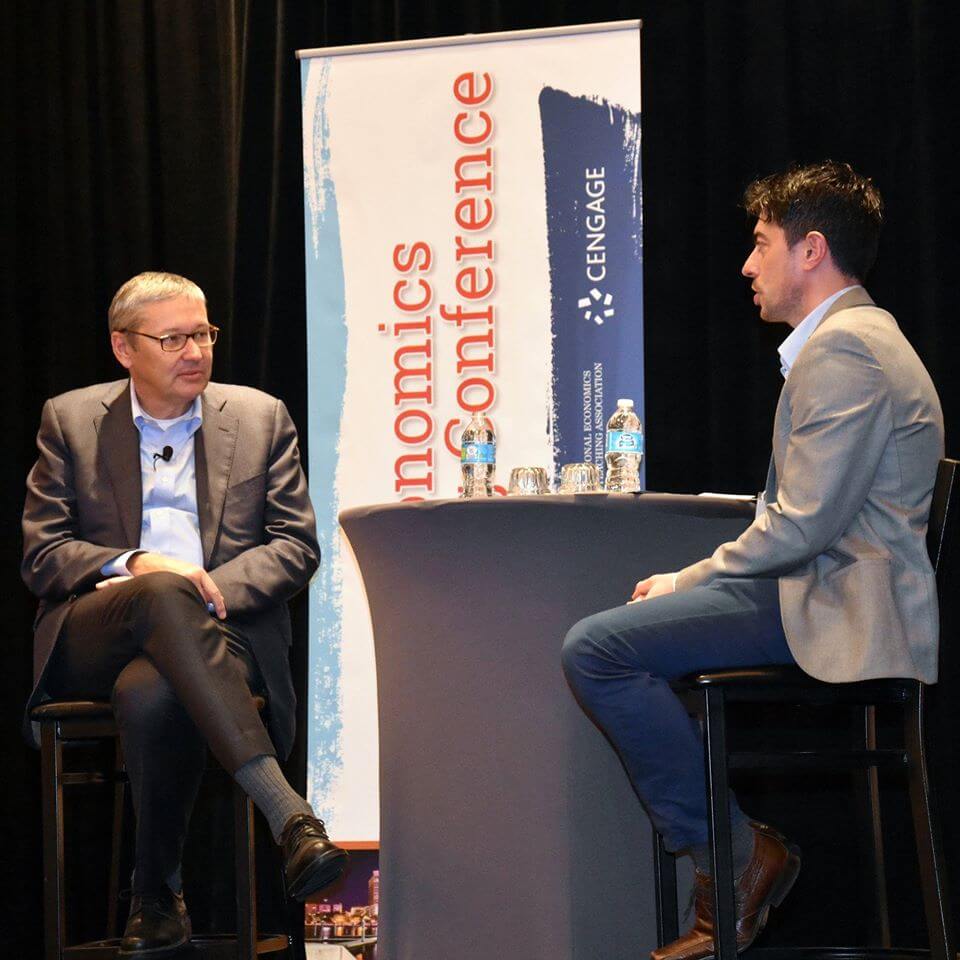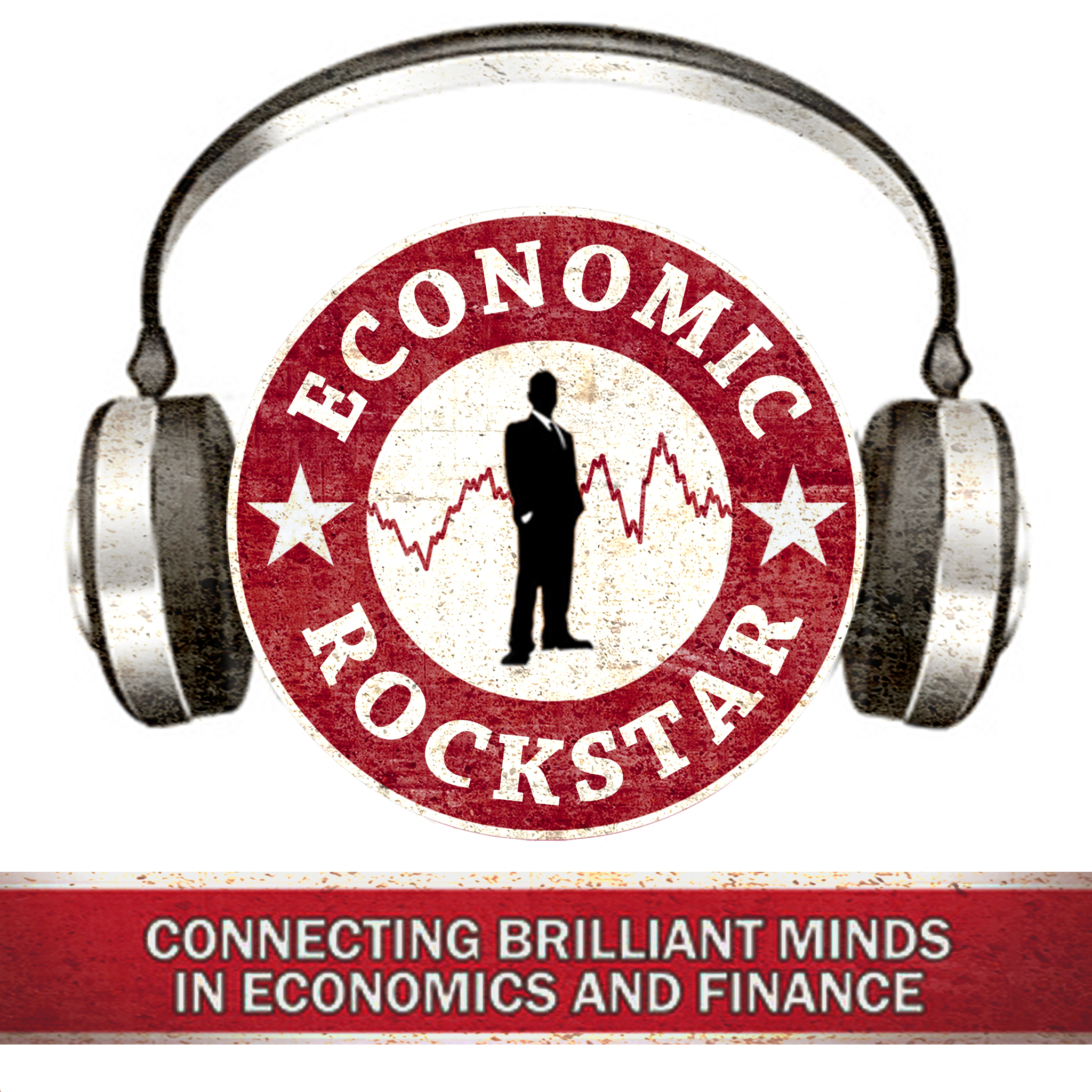111: Greg Mankiw on Writing, Carbon Tax, Health Care and Education at the Economics Teaching Conference in Florida 2016

Greg Mankiw is the Robert M. Beren Professor of Economics at Harvard University. His research includes work on price adjustment, consumer behavior, financial markets, monetary and fiscal policy, and economic growth.
He has written two popular textbooks—the intermediate-level textbook Macroeconomics and the introductory textbook Principles of Economics. Principles of Economics has sold over two million copies and has been translated into twenty languages.
In addition to his teaching, research, and writing, Professor Mankiw has been a research associate of the National Bureau of Economic Research, an adviser to the Congressional Budget Office and the Federal Reserve Banks of Boston and New York, and a member of the ETS test development committee for the advanced placement exam in economics. From 2003 to 2005 he served as Chairman of the President’s Council of Economic Advisers.
I sometimes describe myself as a libertarian at the margin. When I take the libertarian party, they seem a little to extreme for me. But given where we’re starting today, I think a little bit more reliance on free markets, individual responsibility and personal liberty will be a good thing – Greg Mankiw.
Economics:
In this episode, Greg discusses and mentions: New Keynesian economics, micrcofoundations to macroeconomics, rational expectations, real business cycles, stochastic DSG models, Pigou Tax, carbon tax, externalities, refundable tax credits, subsidies, healthcare, inequality, unintended consequences, student debt and the Baumol disease.
Economists:
In this episode, Greg discusses and mentions: Richard Lispey, Peter Steiner, Harvey Rosen (Princeton), John Maynard Keynes, James Tobin, Stanley Fischer, Tom Sargeant, Robert Lucas, Alan Blinder, David Romer, Olivier Blanchard, Janet Yellen, Arthur Pigou, Karl Marx, Adam Smith and John Kenneth Galbraith
On Writing Books:
- It does require a fair amount of discipline. That’s the hardest part. I have friends who try to write who have said ‘I’m behind schedule and I’m going to spend the weekend writing three chapters’. That’s a recipe for failure.
- I try to be extremely disciplined about my writing. When I’m writing the books, I wake up and, after I send my kids off to school, it’s the first thing I do everyday.
- I force myself to basically write two pages every day. Two pages is not that much. But if you write literally two pages every single day for a year – 365 days – that’d be a good-sized book at the end of the year. So that’s the hardest part – staying disciplined and keeping at it everyday.
On Pedagogy and Technology:
The technology has changed radically [since the first edition of Mankiw’s Intermediate Macro book]. The pedagogy is electronic where increasingly the number of people using online books has been rising. I’m actually kind of old-fashioned – a bit of a Luddite when it comes to these things but actually for the first time this year at Harvard we’re using the online book with the MindTap product.
Links:
- Cengage Learning
- MindTap
- Pigou Club
- Before the Flood (a movie about climate change) by Leonardo DiCaprio
- Revenue-Neutral Carbon Tax in Washington State
Podcast: Play in new window | Download
 029: John Cochrane on the Future of Finance, MOOC Education, Regulation and the Case for Free Markets
029: John Cochrane on the Future of Finance, MOOC Education, Regulation and the Case for Free Markets 100: Emily Skarbek on the Economics of Natural Disasters and the Samaritan’s Dilemma
100: Emily Skarbek on the Economics of Natural Disasters and the Samaritan’s Dilemma 096: Cameron Murray on the Robinson Crusoe Economy and Blogging toward your PhD
096: Cameron Murray on the Robinson Crusoe Economy and Blogging toward your PhD 137: Rakesh Ramachandran on Crypto Economics and How Knowledge of Austrian Economics Created His Blockchain Company QBRICS
137: Rakesh Ramachandran on Crypto Economics and How Knowledge of Austrian Economics Created His Blockchain Company QBRICS 170: Jim Rogers on Investing in 2019 and the US Debt Problem
170: Jim Rogers on Investing in 2019 and the US Debt Problem 015: Niels Kaastrup-Larsen on Trend Following Strategies and Stock Market Turmoil Ahead
015: Niels Kaastrup-Larsen on Trend Following Strategies and Stock Market Turmoil Ahead 020: George Magnus on The Age of Ageing, China and the EU
020: George Magnus on The Age of Ageing, China and the EU 161: Tyler Cowen on Stubborn Attachments – A Vision for a Society of Free and Prosperous Individuals
161: Tyler Cowen on Stubborn Attachments – A Vision for a Society of Free and Prosperous Individuals 142: Niels Kaastrup-Larsen on Time, Diversification and Asset Allocation in Trend Following Strategies
142: Niels Kaastrup-Larsen on Time, Diversification and Asset Allocation in Trend Following Strategies 091: The Age of Em by Robin Hanson
091: The Age of Em by Robin Hanson
 David Zetland
David Zetland
November 14, 2016 at 12:38 pmAt the end of your talk, you asked Greg about Basic Income. His answer was deeply unsatisfying. As he said, “more education” (a cure all from academics, if ever there was one) is both slow AND difficult to “give” to everyone. Even worse, those educated at Harvard are far more likely to be successful (either through brains or connections) than those 99% of college grads who cannot attend ivy league schools. Mankiw’s “solution” in other words, does little or nothing about insecurity or inequality.
A basic income program is far faster to implement and much better at addressing insecurity and/or poverty (just ask unemployed college grads about the value of their degree!). Greg worries about “reduced efficiency” but I doubt that people like him (making $1 million + per year) are going to stop working from higher taxes* or that people will work less. Sure, some will, but often for medical or family reasons. Many more will take “more satisfying jobs” that are perhaps more socially than financially rewarding.
* BI must be funded, but not necessarily by higher taxes. Besides lowering spending on other forms of welfare (especially of the corporate sort), there are also better sources of revenue, e.g., property taxes (redistribution from the 1 percent) or carbon taxes (pigouvian taxes).
 Frank
Frank
November 19, 2016 at 12:27 amPerhaps I could have enquired more and opened the conversation up a bit. I’m actually just finished an interview with an undergrad student of mine (Jonathan McEvoy) who addresses the issues of what we could do to alleviate poverty and high levels of income disparity. This will be released as episode 113.